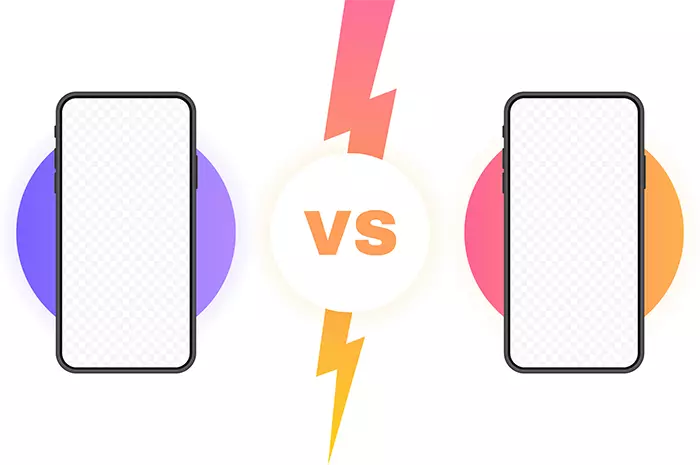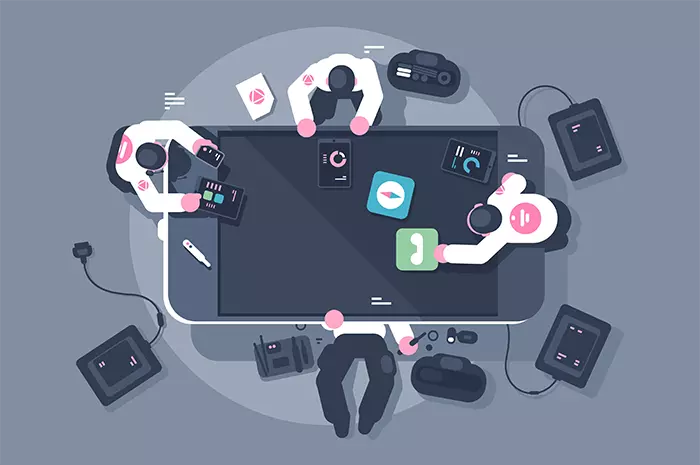Mobile application development continues to expand and is currently considered to be the most thriving business. It is the quickest growing software industry in the world with the revenues being claimed to reach about 77$ billion dollars by this year. There are a plenty of mobile app developers targeting to conquer this money-spinner torrent.
Most businesses, big or small, are developing mobile applications for both iOS and Android platforms to connect with their target group. Both the software applications by Apple and Google have deeply dominated the mobile industry since the emergence of smartphones. “While Android holds more than 75% of the market share, the average revenue of iOS developers is more than double of their Android counterparts.”
When developing an app for any kind of business, BluEnt targets both platforms, however, how they approach the development of both applications is different. It is a customary process for every company to build on one platform first, test it, get feedback on the same, make iterations and then develop the other software.
There are major differences when developing applications for both iOS and Android. BluEnt throws some light on these differences and factors we need to consider when developing Android app and iOS applications.
Design implications: Screens and Resolutions:
iOS:
Apple develops a finite range of devices based on the design of the iPad and iPhone. It’s easy for one to familiarize themselves with these devices. In this case, the screen and resolution do not signify complications or unnecessary importance. iOS hence forms a safe bet if one wants a clear-cut option.
Android:
There are a plethora of manufacturers making devices with Android software. So yes, they come in many shapes and sizes. This makes it a bit complicated for the developers.
Hardware configurations and limitations:
iOS:
When developing an app on iOS operating software, again, the complications are few. The different hardware configurations here are not many. Apple has all its devices suited with superior quality hardware and their products can be augmented with a great range of peripherals.
Android:
Specifications are supreme. Developers has access to a wider range of capabilities when it comes to this operating software.
Differing visual impacts:
iOS:
When using the iOS app the consumer is aware of the fact that they are using a mobile app. They aim at creating a sleek design for this operating software. These apps have a tab bar that allows access to the top level pages of an app.
Android:
These app designs are more real-life like. The effect that Google’s material design tries to attain is that of looking at a piece of paper. Google’s UI components have edges, seams and shadows that help in acquiring this visual effect. The general layout of this app itself is very different – it integrates a drawer system that gives access to the top-level pages.
Development time:
iOS:
It takes lesser time to develop an iOS application. After the iOS is written and deployed to the testing devices, it is ready to find bugs.
Android:
Takes a longer time as the app is needed to be tested across a higher range of devices which have different capabilities. In case there is a problem, post it being fixed, the developers need to begin testing once more on the same range of devices.
Coding Languages:
iOS:
Around the year 2015, iOS had shifted to a new programming language called Swift. It is considered to be simpler and more powerful than the previous programs. In order to develop this app, the developers run the Xcode IDE. Xcode is only available on OS X so they use a Mac or a MacBook to get started. Once Xcode is started, they code the app using Swift. The app can even be coded using another language such as Objective C or mix it with C++.
Android:
The chief language for this app development is Java. Android Studio is used for coding the app using this language. There is also an option of downloading the Android NDK and writing the app in C and C++. There are different forms and layers for the mobile-specific codes but any good Java programmer can easily code for Android.
Creating a win-win situation through Cross-Platform Development
Most of the apps have to be multi-platform to assure that the businesses reach out to the masses. Developing both apps simultaneously is a great solution to minimizing both time and costs. By using cross-platform tools, app developers can build both apps at the same time.
BluEnt allows organizations to develop cross-platform apps for a variety of business purposes. Our expert developers can build the app for you and launch it on both Android and iOS. Drop us a message to know more on what we can do for your organization and how we can help you counter all the challenges when creating an app.
Maximum Value. Achieved.



 How Much Does App Development Cost? A Budget Estimation Guide
How Much Does App Development Cost? A Budget Estimation Guide  Using Angular to Develop Mobile Apps Can Be a Game Changer for Your Business
Using Angular to Develop Mobile Apps Can Be a Game Changer for Your Business  Pros and Cons of the WooCommerce Plugin for Online Merchants
Pros and Cons of the WooCommerce Plugin for Online Merchants  Mean Stack vs LAMP Stack: Which One is Better for Your Business?
Mean Stack vs LAMP Stack: Which One is Better for Your Business? 
